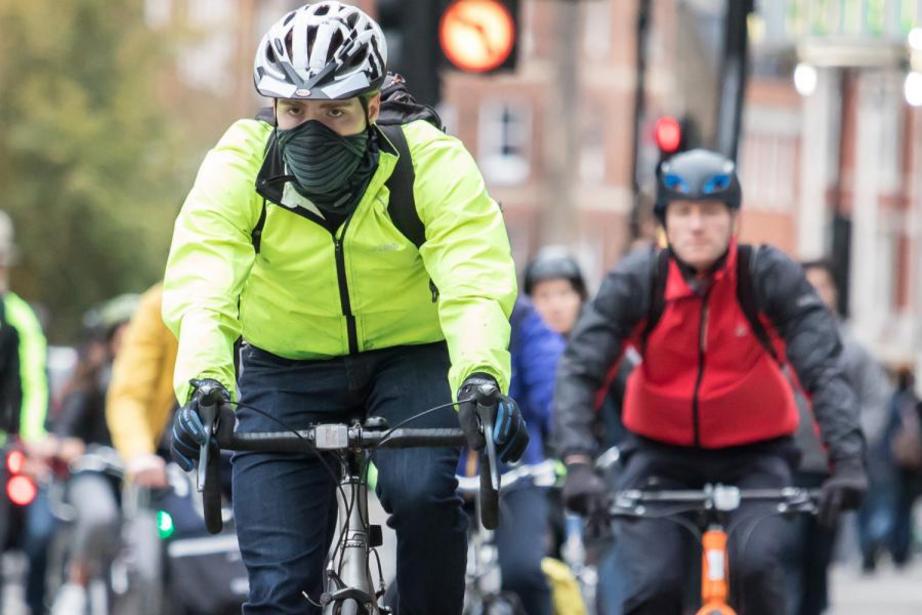44 UK towns and cities have air 'too dangerous to breathe', report claims
More than 40 of the UK’s largest towns and cities have air considered too dangerous to breathe, including London, a report has shown.
Pollution levels in 44 out of the 51 places studied exceeded the WHO's safety limits for fine sooty particles, which have been linked to heart disease and premature death.
Exposure to the particles, known as PM2.5s, should not exceed 10 micrograms per cubic metre of air, according to the health organisation.
But in numerous British towns and cities annual average levels are higher, sometimes by a significant degree, it is claimed.
Up to 9,000 people die from pollution each year in London (Getty Images)
London had 15 micrograms of the particles in every cubic metre-sized parcel of air, beaten only by Glasgow which had 16.
Activists in the capital shut down Tower Bridge yesterday as they staged a protest against air pollution. The protesters marched onto the Thames crossing and blocked off the road during the afternoon.
The study, published in the Lancet Medical Journal, revealed that Leeds equalled London's level, as well as the seaside resort of Eastbourne and port city of Southampton.
(view gif. at link below)
Each year, outdoor air pollution is estimated to cause 40,000 premature deaths in the UK - up to 9,000 in London alone - and cost the country £22.6 billion.
Dr Toby Hillman, one of the report's authors from the Royal College of Physicians, said: "There isn't a safe limit for the amount of pollution that's been defined as yet and we know the effects of poor air quality run from cradle to grave; it's a lifetime threat to human health.
"This is a really direct and tangible impact on UK health from the drivers of climate change, and taking action on air quality should be a priority."
The impact of air pollution in UK cities forms part of a major investigation looking at the health and social costs of climate change around the world led by a top medical journal.
The Lancet Countdown on Health and Climate Change brought together 24 institutions and inter-governmental organisations including the WHO and World Meteorological Organisation.
It found that global exposure to dangerous levels of air pollution caused by burning fossil fuels had increased by 11.2 per cent since 1990 with more than 70% of cities exceeding WHO PM2.5 limits.
Pollution in London
(view pictures at link below)
Many British cities and towns also broke the WHO limits for PM10s, slightly larger sooty specks considered less of a hazard than ultra-fine particles but still harmful to health.
The authors acknowledged that European Union air quality guidelines were far less stringent than those of the WHO, with an upper safety limit for PM2.5s of 25 micrograms per cubic metre.
However, they said the WHO limits represented a "safer threshold".
The report added that 802 London schools and a high proportion of the capital's hospitals and clinics were located in highly polluted areas "potentially putting some of society's most vulnerable people at risk".
Diesel-powered vehicles, which generate pollution particles, were one of the "key drivers" of poor air quality in towns and cities in the UK, said Dr Hillman.
"Unfortunately previous policies about encouraging diesel adoption have led to an increase in the amount of diesel related pollution," he said.
In a "briefing for UK policymakers" the report called for the expansion of Clean Air Zones nationwide and wider introduction of measures similar to London's new T-charge, which imposes a levy on drivers of the most polluting vehicles.
The report pointed out that between 2000 and 2016 there had been a 46 per cent increase in the number of weather-related disasters around the world. During the same period of time 125 million vulnerable adults over the age of 65 had been exposed to heatwaves.
In addition, climate change had increased the threat from mosquito-borne infectious diseases.
Transmission of dengue fever by the Aedes agypti mosquito had increased by 9.4 per cent since 1950.
Professor Hugh Montgomery, co-chair of The Lancet Countdown and director of the Institute for Human Health and Performance at University College London, said: "We are only just beginning to feel the impacts of climate change.
"Any small amount of resilience we may take for granted today will be stretched to breaking point sooner than we may imagine."
Dr Penny Woods, chief executive of the British Lung Foundation, said the Government should end incentives to buy diesel vehicles and commit to a new Clean Air Act.
She added: "This study reveals the tragic reality that the most polluted areas are exactly where our most vulnerable are - schools, hospitals and clinics. The extent of the public health emergency we are facing demands nothing less than urgent action to protect our lung health."
Forty-three of the cities and towns are in the British Isles, with the 44th being Gibraltar.
For the rest of this article please go to source link below.

